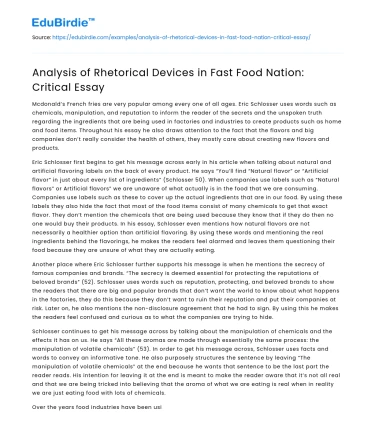Mcdonald’s French fries are very popular among every one of all ages. Eric Schlosser uses words such as chemicals, manipulation, and reputation to inform the reader of the secrets and the unspoken truth regarding the ingredients that are being used in factories and industries to create products such as home and food items. Throughout his essay he also draws attention to the fact that the flavors and big companies don’t really consider the health of others, they mostly care about creating new flavors and products.
Eric Schlosser first begins to get his message across early in his article when talking about natural and artificial flavoring labels on the back of every product. He says “You’ll find “Natural flavor” or “Artificial flavor” in just about every list of ingredients” (Schlosser 50). When companies use labels such as “Natural flavors” or Artificial flavors” we are unaware of what actually is in the food that we are consuming. Companies use labels such as these to cover up the actual ingredients that are in our food. By using these labels they also hide the fact that most of the food items consist of many chemicals to get that exact flavor. They don’t mention the chemicals that are being used because they know that if they do then no one would buy their products. In his essay, Schlosser even mentions how natural flavors are not necessarily a healthier option than artificial flavoring. By using these words and mentioning the real ingredients behind the flavorings, he makes the readers feel alarmed and leaves them questioning their food because they are unsure of what they are actually eating.
Save your time!
We can take care of your essay
- Proper editing and formatting
- Free revision, title page, and bibliography
- Flexible prices and money-back guarantee
Another place where Eric Schlosser further supports his message is when he mentions the secrecy of famous companies and brands. “The secrecy is deemed essential for protecting the reputations of beloved brands” (52). Schlosser uses words such as reputation, protecting, and beloved brands to show the readers that there are big and popular brands that don’t want the world to know about what happens in the factories, they do this because they don’t want to ruin their reputation and put their companies at risk. Later on, he also mentions the non-disclosure agreement that he had to sign. By using this he makes the readers feel confused and curious as to what the companies are trying to hide.
Schlosser continues to get his message across by talking about the manipulation of chemicals and the effects it has on us. He says “All these aromas are made through essentially the same process: the manipulation of volatile chemicals” (53). In order to get his message across, Schlosser uses facts and words to convey an informative tone. He also purposely structures the sentence by leaving “The manipulation of volatile chemicals” at the end because he wants that sentence to be the last part the reader reads. His intention for leaving it at the end is meant to make the reader aware that it’s not all real and that we are being tricked into believing that the aroma of what we are eating is real when in reality we are just eating food with lots of chemicals.
Over the years food industries have been using many tactics such as new flavors, commercials with celebrities, Super Bowl ads, and social media to capture the attention of their consumers. In his article, Eric Schlosser says “At Burger King, Wendy’s, and Mcdonald’s coloring agents have been added to many of the soft drinks, salad dressings, cookies, condiments, chicken dishes, and sandwich buns” (54). Schlosser mentions popular fast food chains such as Mcdonald’s and Burger King because he knows that they are famous among the people in America and around the world; he also knows that it will grab the reader's attention. Schlosser conveys this message by mentioning the usage of coloring agents in popular food items and he does this to make his readers feel horrified, shocked, and somewhat disgusted with what they have been eating.
Toward the end of his paper, Schlosser continues to get his message across by mentioning the blind sniff test that was done on him by Flavors Grainger. “The aroma was uncanny, almost miraculous- as if someone in the room were flipping burgers on a hot grill. But when I opened my eyes, I saw a narrow strip of white paper and a flavorist with a grin” (56). Schlosser uses the word “ uncanny” when talking about the aroma because he thought it was strange how just taking a sniff of a piece of paper made him believe that there was someone actually grilling fresh burgers. He also uses the word “miraculous” as if it’s such a magical thing, like a magician doing tricks. When Schlosser opens his eyes he sees Grainger with a grin, by mentioning the flavorist with a grin sends the reader a message, the message being that the florist knows that he tricked you because of his overconfident “I know” grin. Schlosser does this on purpose, he does this to make the reader feel as if they are being played and fooled.
In conclusion, Eric Schlosser was able to get his message across through his words by informing people about the unspoken truth and about what we’re consuming. Throughout the essay, Eric Schlosser uses his informative journalism skills to get his point of view and message across. He also uses examples in his essay of how food is made and what ingredients/chemicals are put into not only food and fruits but also household products. Schlosser mentions the ingredients so that people are more aware of certain products, he also does it to somewhat educate the readers.






 Stuck on your essay?
Stuck on your essay?

